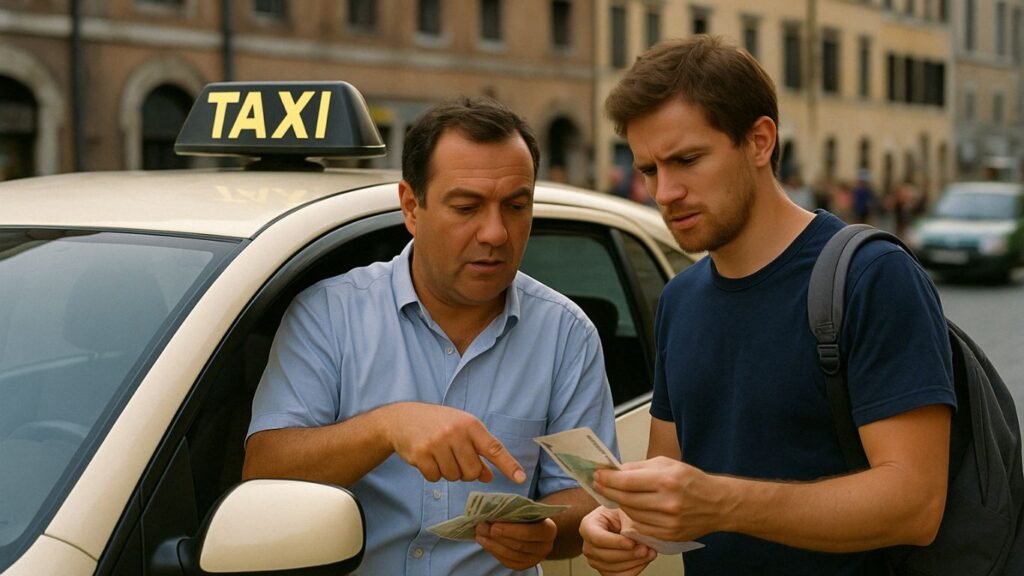Travel opens doors—to cultures, to landscapes, and, unfortunately, to opportunists who see tourists as easy prey. Whether you’re navigating the souks of Marrakech, hailing a cab in Bangkok, or marveling at historic ruins in Rome, scams are a universal hazard that can turn a dream trip into a costly lesson. While most locals are warm, welcoming, and genuine, there’s always a small percentage who exploit unfamiliarity for profit.
The rise of digital nomadism and budget travel has made the world feel more accessible, but it has also given scammers new ways to target unsuspecting visitors. According to a Global Rescue report, tourists are particularly vulnerable in high-traffic areas like transport hubs, crowded markets, and popular attractions. These scams range from petty theft to sophisticated cons involving fake officials or forged documents—and they often prey on our natural inclination to trust.
Knowing how to avoid travel scams abroad is no longer just a smart idea; it’s an essential part of trip planning. Travelers who arm themselves with the right knowledge, stay alert, and understand how scams typically unfold are far less likely to fall victim.
In this guide, we’ll explore ten of the most common travel scams you’re likely to encounter, offer practical tips on how to recognize and avoid them, and explain exactly what to do if the worst happens. With the right mindset and a bit of preparation, you can stay one step ahead of the scammers—and keep your travel experience focused on discovery, not deception.
Table of Contents
10 Common Travel Scams to Watch For

Understanding how to avoid travel scams abroad starts with knowing what to look out for. These scams, though often simple in execution, can be remarkably effective—especially when disguised with charm, urgency, or a touch of local flair. Below are ten of the most notorious tricks used by scammers worldwide.
1. The “Friendly Local” Scam
It often starts with a smile, a warm greeting, and a helping hand. A seemingly friendly local offers unsolicited advice—maybe a shortcut to a tourist attraction, a recommendation for a nearby shop, or even companionship for a cup of tea. What appears to be a genuine gesture quickly turns sour: they might lead you to an overpriced venue where they get a cut, or they could distract you while an accomplice picks your pocket.
This scam thrives on the victim’s desire to be polite. In some cases, these “friends” can guilt-trip tourists into buying expensive items or paying for meals. Always approach unsolicited friendliness with caution, especially in high-tourist zones.
2. Fake Taxi/Ride-Sharing Scams
From airport exits to busy downtown streets, unlicensed taxis are a global menace. Common red flags include broken meters, route detours, or outrageous fare demands at your destination. Some even pose as ride-share drivers, preying on travelers unfamiliar with the app or the local language.
Avoiding this scam is straightforward: only use registered taxis or ride-sharing services you book through official apps. Before getting in, confirm the price or ensure the meter works—and always know the estimated cost of your route beforehand.
3. ATM Skimming and Card Fraud

Card skimming is a silent predator. In seconds, scammers can clone your card using hidden devices attached to ATMs, often paired with miniature cameras to capture your PIN. You might not realize it until days later, when fraudulent charges appear on your statement.
To minimize risk, use ATMs inside reputable banks or hotels. Cover your hand while entering your PIN, and enable transaction alerts on your bank app to catch any suspicious activity early. Better yet, carry a secondary travel card with limited funds as a buffer.
4. The “Distraction” Theft
Picture this: someone spills sauce on your shirt, a child bumps into you, or a street performer draws your attention. Meanwhile, your wallet, phone, or camera vanishes. These distractions are carefully orchestrated, often involving teams who create chaos while another lifts your valuables.
Stay vigilant in crowded places—markets, festivals, and metro stations are prime spots. Keep your bag zipped and close to your body, preferably with anti-theft features like hidden compartments or slash-proof straps.
5. Fake Wi-Fi Hotspots
The promise of free internet in a foreign country can be hard to resist. Scammers set up rogue networks in cafés, airports, or public squares with names like “Free_Airport_WiFi” or “HotelGuest.” Once you connect, they can intercept your data—emails, passwords, and even bank details.
Use a VPN whenever you’re online abroad, even on hotel networks. Better yet, get a local SIM card with data or stick to mobile hotspots you control.
6. Overpriced Souvenirs and Services
This scam is subtler than most—but just as insidious. You might get lured into a shop where the owner insists you try a local product or handmade item. The pressure mounts until you feel compelled to buy, often at inflated prices. Similarly, services like photo ops with animals or henna tattoos might come with hidden charges after the fact.
Always ask for prices beforehand, and don’t be afraid to walk away. Research local prices for souvenirs so you can better negotiate—or simply avoid tourist-trap shops altogether.
7. The “Broken Meter” Scam
Taxi drivers in some cities will tell you the meter is broken and suggest a flat rate that turns out to be double or triple the actual fare. They rely on your urgency or confusion—especially after long flights or late-night arrivals.
Combat this by insisting on the meter or using official apps. If they refuse, exit the vehicle. In some destinations, it’s safer to arrange airport pickups in advance to avoid this common trick altogether.
8. Fake Police/Official Scams
One of the more unsettling scams involves individuals impersonating police officers or government agents. They might accuse you of carrying counterfeit money, demand to see your passport, or request a fine on the spot. In reality, they are thieves in disguise.
Real police won’t demand payment in cash or insist you hand over documents without due process. If approached, ask to see ID and suggest going to the nearest police station. Keep digital copies of your passport stored securely online, so you don’t have to surrender the original.
9. Accommodation Scams (Fake Rentals)
With the rise of booking platforms like Airbnb, fake listings have become increasingly common. Scammers post attractive properties at low rates, collect a deposit, and then disappear. Others send fraudulent links or demand payments outside the platform.
Always book through verified platforms, avoid off-site payment requests, and read reviews carefully. If something feels off—like overly polished photos or vague descriptions—move on. You don’t want to be stranded on arrival.
10. Charity and Petition Scams
Outside train stations and popular landmarks, you may encounter young people with clipboards asking for signatures to support a cause. Once you sign, they ask for a “donation.” Sometimes it’s a genuine hustle for cash; other times, it’s a setup for pickpocketing.
Be skeptical of street petitions, especially if they seem aggressive or invasive. A polite but firm “no, thank you” is your best response.
Prevention and Protection: How to Avoid Travel Scams
Knowing the scams is only half the battle—avoiding them requires awareness, preparation, and smart decision-making. This section offers practical strategies for how to avoid travel scams abroad, so you can protect your wallet and peace of mind without sacrificing the spontaneity and joy of travel.

Research Your Destination
Every destination has its own brand of tourist traps. In Paris, you might face the bracelet scam near Montmartre; in Bangkok, it’s tuk-tuk drivers offering “free” tours. Researching common local scams before you travel equips you with the knowledge to identify warning signs early. Guidebooks, forums like Reddit’s r/travel, and government travel advisories are excellent starting points.
Understanding how to avoid travel scams abroad begins before you even board the plane. Know the norms around tipping, typical taxi fares, and areas known for theft. Preparation equals prevention.
Be Aware of Your Surroundings
One of the most effective defenses against scams is situational awareness. Scammers target people who look lost, distracted, or disengaged. Make it a habit to scan your environment. Avoid checking maps in public—duck into a shop or café instead. And don’t wear headphones while walking unfamiliar streets.
Even seasoned travelers can get caught off guard, but awareness is often the difference between becoming a mark and staying safe. Carry yourself with confidence, and always trust your gut if something feels off.
Use Reputable Services
Stick to established providers for transportation, lodging, and guided tours. Whether you’re booking a tuk-tuk in Cambodia or a safari in Kenya, choosing reputable operators is essential. Use official apps, verified websites, or recommendations from trusted travel blogs.
Reputation matters when figuring out how to avoid travel scams abroad. If a deal seems too good to be true, it usually is. Always check for business licenses, reviews, and contact information before making any payments.
Protect Your Personal Information
In an era where a single tap can reveal your entire identity, protecting your personal information is non-negotiable. Avoid entering sensitive details on public Wi-Fi unless you’re using a VPN. Keep your passport locked in your hotel safe and never hand over original documents to strangers.
A common scam involves copying your passport under the guise of checking ID. Instead, carry a copy and a digital scan. The fewer chances scammers have to access your information, the safer your trip will be.
Trust Your Instincts
If someone is pressuring you to act fast—sign a petition, hop in a taxi, buy something “only available today”—pause. Scammers often create urgency to override logic. Your instincts are powerful tools when figuring out how to avoid travel scams abroad. If something doesn’t feel right, it probably isn’t.
Saying “no” assertively and walking away can be your greatest shield. You owe politeness to no one who makes you uncomfortable.
Have Backup Plans and Documents
Even with the best precautions, things can go wrong. Always have backup payment options: a second card, cash in a hidden pocket, or a prepaid travel card. Keep digital copies of your passport, travel insurance, and itinerary accessible via encrypted cloud storage.
Preparation won’t prevent all mishaps, but it softens the blow. Being proactive about your backups is a key part of knowing how to avoid travel scams abroad—and recovering if one slips through.
Use Secure Payment Methods
Cash-only deals are a red flag. Use credit cards when possible—they offer better fraud protection and easier dispute resolution. If you must use cash, count it carefully and avoid flashing large bills.
Never wire money to unknown contacts or pay for bookings via sketchy links. Stick to reputable payment platforms that offer protection and traceability.
Stay Connected Safely
Let friends or family know your general itinerary and check in regularly. Use secure messaging apps and avoid oversharing on social media, especially in real time. Thieves can track hashtags and location tags to find their next victim.
Knowing how to avoid travel scams abroad isn’t just about face-to-face interactions—it’s also about maintaining digital safety on the go.
Document Everything
From cab receipts to hotel bookings and entry tickets, documentation helps you track spending and verify claims if things go sideways. If you feel you’ve been overcharged or deceived, having proof bolsters your case with authorities or your credit card company.
Take photos of license plates, business cards, or even the exterior of sketchy shops if you need to report something later. Keep your phone charged and ready.
Know Local Emergency Numbers
Each country has its own version of 911. Whether it’s 112 in Europe or 000 in Australia, program the local emergency numbers into your phone. Also, know how to reach your country’s embassy or consulate in case you lose your passport or face a serious incident.
Quick access to help can turn a crisis into an inconvenience. It’s a small step with major payoff, and it completes your toolkit for how to avoid travel scams abroad.
What to Do If You Become a Victim
Even the most seasoned travelers can get caught off guard. Scammers often rely on speed, confusion, or charm to catch their targets before suspicion kicks in. If you do fall victim, don’t panic—swift, deliberate action can help minimize the damage. Knowing how to avoid travel scams abroad also means knowing what to do when prevention isn’t enough.
Report the Scam Immediately
The first step is to alert local authorities. File a police report as soon as possible—even if the scam seems minor. Not only does this increase your chance of recovery, but official documentation will also help you when filing insurance claims or disputing charges later.
Find a nearby police station or ask your hotel concierge for assistance. In some cases, such as impersonation scams, swift reporting may lead to arrests or disruptions in the scam ring. Don’t wait—it only reduces the odds of resolution.
Contact Your Bank/Credit Card Company
If money was involved—through a fraudulent ATM, overcharged card, or bogus booking—notify your financial institution right away. Most banks have 24/7 hotlines for lost or stolen cards, and many credit cards offer fraud protection and emergency replacement options.
Cancel or freeze compromised cards immediately. If you’ve used a reputable bank or card provider, you’ll likely be able to recover lost funds. This is another reason why digital vigilance is central to how to avoid travel scams abroad, even after the fact.
Seek Assistance from Your Embassy/Consulate
If you’ve lost important documents like your passport, or if you feel unsafe, reach out to your country’s embassy or consulate. They can help you get emergency travel documents, provide legal support, and offer guidance on what to do next.
Most embassies have emergency contact numbers for travelers in distress. In serious cases—like being detained due to a scam involving forged paperwork—they may intervene on your behalf. Their support can be a lifeline in unfamiliar territory.
Gather Evidence and Documentation
Photos, receipts, screenshots, bank statements, and even emails with scammers can be crucial when reporting the incident. If someone tricked you into booking a fake tour or paying a fraudulent fine, document every detail—what they said, what they looked like, when and where it happened.
The more evidence you collect, the stronger your case—whether it’s with local law enforcement, your embassy, or your travel insurer. And this habit, like many others in this guide, aligns with the broader approach of how to avoid travel scams abroad through preparation and foresight.

Conclusion
Travel should be filled with joy, not regret. From the cobbled alleys of Eastern Europe to the bustling night markets of Southeast Asia, the world is breathtaking—but it also requires you to stay sharp. Scams, in their many forms, are a reality of international travel. But with the right awareness and preparation, you can outsmart them every time.
Let’s recap the core strategies that show you how to avoid travel scams abroad:
- Research your destination thoroughly—know what scams to expect.
- Stay alert in crowds and trust your instincts.
- Use reputable services for transportation, accommodation, and excursions.
- Protect personal information, online and off.
- Document everything, and have backup plans in place.
- Report incidents quickly and contact your bank or embassy when necessary.
It all starts with a mindset: stay curious, but cautious. Remember that knowing how to avoid travel scams abroad is just as important as packing your passport or booking your flight. This knowledge doesn’t just protect your money—it safeguards your memories and ensures that your travel experiences remain rooted in connection, culture, and wonder, not frustration or fear.
So, explore freely. Say yes to new experiences. But say no to anything that doesn’t feel right.
The world is waiting. Travel smart—and never let a scam steal your adventure.
FAQ
What are the most common travel scams tourists fall for?
The most common scams include fake taxis with rigged meters, ATM skimming, distraction thefts, fake police demanding on-the-spot fines, and overly friendly locals leading you into high-pressure sales. Understanding how to avoid travel scams abroad starts with being aware of these scenarios and not acting out of urgency or politeness.
How can I tell if someone is trying to scam me?
Red flags include unsolicited help, pressure to act quickly, cash-only requests, and offers that seem too good to be true. Scammers often use charm or urgency to cloud your judgment. If your instincts are telling you something’s off, step away from the situation.
Is it safe to use public Wi-Fi abroad?
Public Wi-Fi is a known vulnerability for travelers. Scammers may set up fake networks to intercept your data. To avoid this risk, use a VPN, or stick to mobile data or personal hotspots. Digital security is a critical part of how to avoid travel scams abroad in today’s connected world.
Should I carry my passport with me while exploring?
Not always. In many cases, a photocopy or digital copy is enough for identification. Carrying your original passport makes you a target for scams involving fake officials or pickpocketing. Secure your actual document in your accommodation’s safe and only bring it when absolutely necessary.
What should I do if I’m scammed and lose money?
Immediately report the incident to local police and notify your bank or credit card provider. Cancel compromised cards and dispute fraudulent charges. If your passport or ID is involved, contact your embassy. The sooner you act, the better your chances of recovery.
Can travel insurance cover scams?
It depends on your policy. Some comprehensive travel insurance plans include coverage for theft or fraud, particularly involving lost money, documents, or digital theft. Always read the fine print before purchasing—and consider choosing a policy that supports those learning how to avoid travel scams abroad with robust fraud protection.
For more official information on financial and travel scams abroad, visit the U.S. Department of State’s guide: Protecting Yourself from International Scams – travel.state.gov.

